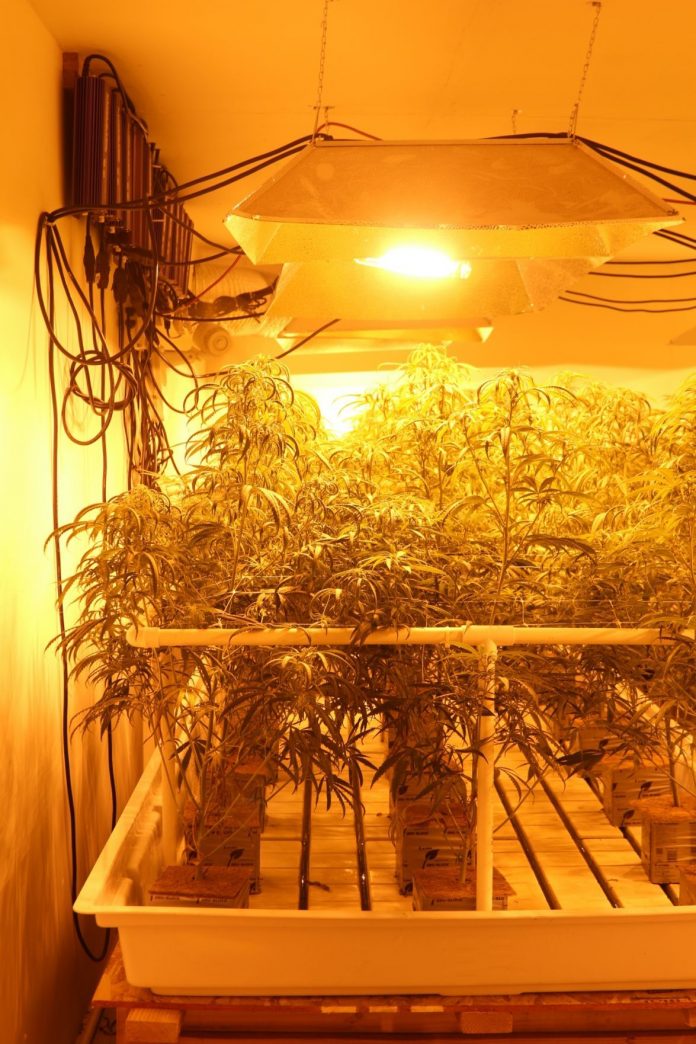With marijuana legal for recreational use in California as of Jan. 1, Morgan Hill police are expecting to see more of the controlled substance on local streets in the coming months. That’s despite the fact that the commercial sale, cultivation, manufacturing and transport of cannabis products remain prohibited in the city limits, at least until after the city council discusses their options at an upcoming meeting.
The voter-approved state law, known as Proposition 64, allows adults age 21 and older to legally possess up to one ounce of marijuana, with or without a state-approved medical ID card, according to Morgan Hill Police Sgt. Troy Hoefling.
However, local marijuana users should know that it remains illegal to smoke pot anywhere in public or on school grounds. Driving under the influence of marijuana is still prohibited statewide, Hoefling said.
“You cannot use or consume marijuana in a car. You can’t have an open container of marijuana in a car,” Hoefling added.
According to ballotpedia.org, Prop 64 permits marijuana smoking in private homes or in businesses licensed for on-site consumption. Prop 64 also allows each adult to grow up to six marijuana plants on private property, as long as the cultivation area is locked and not visible from public view.
Cities, counties and other local jurisdictions may not regulate or limit the six-plant growth allowance under the new state law. However, the new law allows local governments—as well as the state itself—to license, regulate and tax marijuana sales. It also allows locals to license large-scale commercial cultivation operations.
Under previous laws that permit the medical use, sale and growth of marijuana—and in a state regulatory environment that is generally more lenient that many other states—the City of Morgan Hill has traditionally taken the more restrictive path in comparison with some cities in the region.
Currently, Morgan Hill prohibits the sale, cultivation and transport of marijuana for recreational, medical or other uses—a prohibition that is allowed by follow-up legislation approved by the state after Prop 64 passed. In July 2017, the council updated this ordinance to remove references to “medical marijuana” in response to the approval of Prop 64, and clarifies that existing local restrictions apply to both medical and recreational cannabis sales, cultivation and distribution.
The council will revisit the issue and discuss their options at the Jan. 17 meeting, according to City Manager Christina Turner. This discussion will include information on what ordinances or policies other nearby cities are enacting in response to Prop 64. The staff report on that agenda item will be available on the city’s website, morganhill.ca.gov, Jan. 12.
Some California cities, enticed by the promise of a flood of sales tax revenues from recreational marijuana—an industry expected to generate more than $7 billion statewide by 2020—have embraced their new ability to allow retail sales. In San Jose, which approved a licensing program for retail marijuana sales late last year, customers reportedly formed long lines outside licensed dispensaries on Jan. 1, the first day recreational sales became legal in California.
The original ballot summary for Prop 64—which was approved by 57 percent of the state’s voters Nov. 8, 2016—cites “additional tax revenues ranging from high hundreds of millions of dollars to over $1 billion annually, mostly dedicated to specific purposes” resulting from the law’s passage.
This economic development impact is likely one aspect of the marijuana trade that Morgan Hill officials will discuss Jan. 17. The discussion will be a follow-up to previous workshops on the change in marijuana laws that the council conducted throughout 2017. These previous discussions included public comments from marijuana opponents who fear the new law will result in more drug use and danger on the roads, and from supporters who rely on cannabis for chronic medical conditions for which they have to drive to other, more pot-friendly cities to seek treatment.
The City of Morgan Hill could generate between $675,000 and $1.6 million in annual revenue if the council decides to implement a licensing and taxation program for marijuana industry businesses, according to a presentation by HdL Companies at a Sept. 27 council workshop.
Other concerns and challenges related to Prop 64 that cities like Morgan Hill might face under the new law include the proximity of marijuana activities to local youth, impaired driving, continued black market sales, limited police authority to search and seize property and the growth of other crimes inspired by the cannabis trade, according to HdL’s Sept. 27 presentation in Morgan Hill.
Prop 64 imposes a state excise tax of 15 percent on licensed retail sales of marijuana, as well as state cultivation taxes of $9.25 per ounce of cannabis flowers and $2.75 per ounce of leaves, according to ballotpedia.org. The law also establishes packaging, labeling, advertising and marketing standards for marijuana products; prohibits advertising marijuana to minors; and authorizes the resentencing and destruction of record for prior marijuana convictions.
In Santa Clara County, 58 percent of voters voted “yes” to Prop 64, according to the Santa Clara County Registrar of Voters. In Morgan Hill, 57 percent of voters said “yes” to the recreational marijuana law.
The Morgan Hill City Council will discuss its policy options for regulating marijuana sales, cultivation, manufacturing and deliveries under Proposition 64 at the Jan. 17 meeting. The meeting will begin at 5:30pm at Council Chambers, 17555 Peak Ave. The time of the meeting has not A city staff report on the agenda item will be available Jan. 12 on the city’s website, at morganhill.ca.gov.








